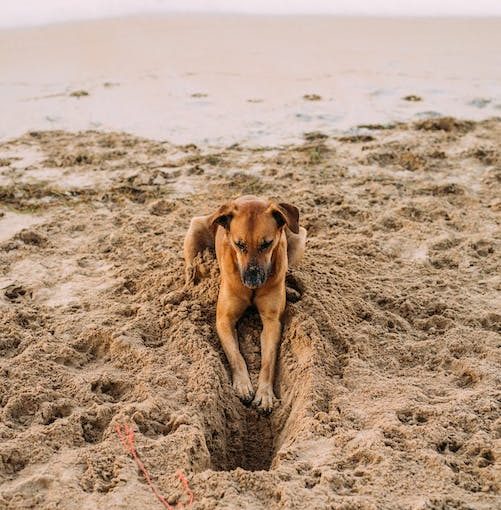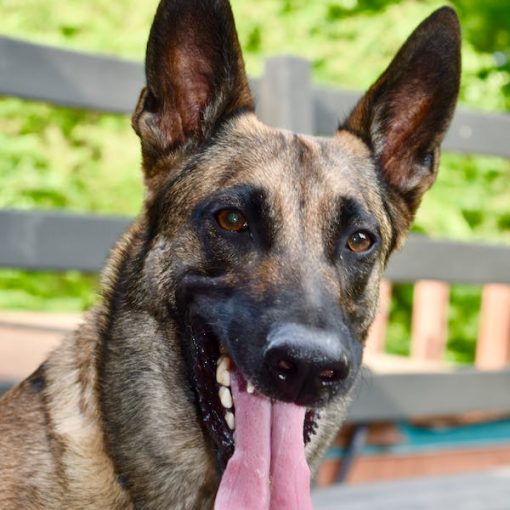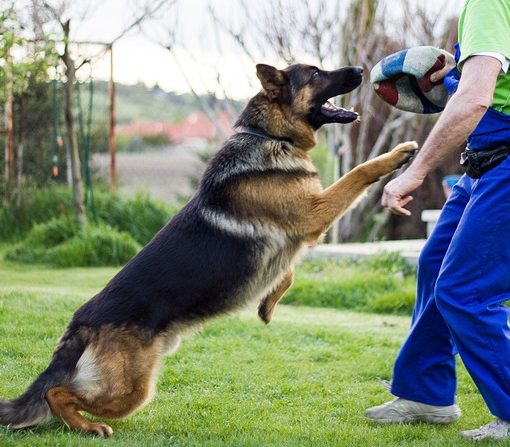The myth of the “dangerous” pitbull is a controversial issue, with some claiming it is more dangerous than German Shepherds.
However, any dog can be aggressive if it feels threatened or is not properly socialized. Depending on training, socialization, and surroundings, both breeds have the potential to be harmful.
Pitbulls were originally bred for bull-baiting, while German Shepherds were bred for herding and guarding. Both breeds are often used as family pets today.
Dog owners should understand the risks involved and take steps to keep themselves and their loved ones safe. By educating themselves on the facts, they can help dispel misunderstandings and dispel myths surrounding pitbulls and other dogs.
Statistics on Dog Attacks
The American Veterinary Medical Association (AVMA) reports that around 4.5 million dog bites occur annually in the U.S., with 800,000 requiring medical attention.
Certain breeds are more likely to be involved in serious attacks. Children are at a higher risk, making up half of all victims and the majority of fatal attacks involving children under 10.
Most dog bites occur within or around the home, with two-thirds occurring within the home or on the owner’s property.
Factors that Make a Pitbull Aggressive
Some of the factors that can make a pitbull more likely to be aggressive include:
- Genetic predisposition
- Traumatic experiences
- Fear or anxiety
- Lack of socialization
- Territoriality
- Status-related aggression
- Pain or illness
- Breed-specific legislation
Genetic predisposition
As mentioned before, some pitbulls may have a genetic predisposition to aggression.
Traumatic experiences
If a pitbull has experienced abuse or neglect in the past, it may be more likely to exhibit aggressive behaviour.
Fear or anxiety
A pitbull that is fearful or anxious may be more likely to lash out in aggression.
Lack of socialization
A pitbull that has not been properly socialized may be more likely to be aggressive.
It’s important to remember that every dog is
Territoriality
Pitbulls that are very protective of their territory, such as their home or yard, may be more likely to be aggressive.
Status-related aggression
Pitbulls who are trying to assert dominance or status over other dogs may be more likely to be aggressive.
Pain or illness
As mentioned before, a pitbull that is in pain or suffering from an illness may be more likely to act aggressively.
Breed-specific legislation
Breed-specific legislation on pitbulls may increase aggression due to perceived threats or stress, posing a danger to both pitbulls and their owners. BSL can also lead to overrepresentation in shelters and euthanasia, exacerbating the issue.
Risks German Shepherds Will Face After Being Attacked By A Pitbull
After being attacked by a pitbull, your German Shepherd may face several risks. If you notice any unusual behaviour in your German Shepherd, it’s crucial to seek help from a professional.
List of Risks German Shepherds will face after being attacked by a pitbull;
- Physical injuries
- Psychological trauma
- Rabies exposure
Physical injuries
Following an attack, your German Shepherd may sustain injuries ranging from minor cuts to severe surgery, as well as more severe wounds or fractured bones.
Psychological trauma
Your German Shepherd may experience fear, aggression, anxiety, and difficulty sleeping due to physical injuries requiring medical attention, as well as psychological trauma from the attack.
Rabies exposure
It could be necessary to isolate your German Shepherd and keep an eye out for any symptoms of the disease if the attacking dog was not rabies-vaccinated. If your German Shepherd has contracted rabies, they may need quarantine. It’s crucial to monitor their behaviour and seek veterinary help if any changes are observed.
Ways to Reduce Pitbull Attacks on Your German Shepherd
Measures you can take to reduce the risk of Pitbull attacks on your German shepherd.
These include:
- Educate ourselves and our children
- Ensuring that dogs are properly socialized and trained.
- Spaying or neutering dogs to reduce aggressive behaviour.
- Providing adequate exercise and stimulation for dogs.
- Not leaving children unattended with dogs.
- Keeping dogs on a leash when they are in public.
Educate ourselves and our children
We must teach our kids and ourselves the importance of safe dog relationships, emphasizing that they should never approach or pet a dog without the owner’s permission. It is also crucial to monitor children around dogs, even if they are familiar with them, as dogs can be unpredictable.
Socialization and training of dogs
Proper socialization and training are essential for dogs to avoid fear and aggression, ensuring they become well-adjusted, confident, and well-behaved. Enrolling in obedience training or socialization classes can help dogs learn how to behave around other dogs, making them a joy to be around and less likely to cause problems.
Spaying or neutering dogs
Neutered or spayed dogs reduce aggression due to higher hormone levels in unneutered males and females. While not eliminating aggressive behaviour, it can reduce fear, anxiety, and lack of socialization. Spaying or neutering can also prevent certain cancer types.
Providing adequate exercise and stimulation for dogs
Exercise and stimulation are crucial for a dog’s physical and mental health, as overweight dogs can cause health issues and insufficient stimulation can lead to boredom. Owners can provide exercise through walks, playtime, and socializing at the dog park, while interactive toys like puzzles keep dogs mentally stimulated.
Not leaving children unattended with dogs
Leaving children unattended with dogs can pose a danger, even if the dog is well-behaved. Children can unintentionally provoke the dog by pulling on its ears, tails, or fur, or approach a sleeping or eating dog, leading to defensive behaviour. Playing around a dog can cause falls and injuries, and children may not know how to behave safely. Therefore, supervision is essential when around any animal, including dogs.
Avoid any confrontations
To maintain a healthy relationship with your German Shepherd, avoid confrontations with other dogs. If you see another dog approaching, walk away calmly and quickly, or use a firm, assertive voice to tell them to stay back. It’s also crucial to maintain emotional control, as nervousness or fear can transfer to your dog.
Keeping dogs on a leash when they are in public
Dogs should be kept on a leash in public for safety, control, and reduced risks of accidents, injuries, and fights. It’s easier to control, less likely to bite or scare others and reduces the risk of wildlife chases or property damage. It’s a common courtesy to keep your German Shepherd on a leash.
Up-to-date on their vaccinations
Ensure your German Shepherd is currently on vaccinations and has a robust immune system to safeguard them from potential diseases.
These are just a few of the steps we can take to keep ourselves and our loved ones safe around dogs. By taking these steps, we can reduce the risk of dog attacks and keep our communities safe.
What to do When A Pitbull Attacks your German Shepherd
Here is a list of steps you can take if your German Shepherd is attacked by a pitbull:
- Try to stay calm and assess the situation.
- Do not try to pull the dogs apart with your bare hands.
- Try to separate the dogs by making loud noises or throwing an object.
- If necessary, physically intervene by pulling the pitbull away from your German Shepherd.
- Seek medical attention for your German Shepherd, even if the injuries appear minor.
- Report the attack to the proper authorities.
New Post: Where Can I Surrender My German Shepherd
Try to stay calm and assess the situation
To protect your German Shepherd from a pitbull attack, maintain calmness and focus. This will enable better decision-making and ensure the safety of both you and your dog, with the primary concern being your safety.
Do not try to pull the dogs apart with your bare hands
When dealing with two dogs fighting, avoid using bare hands to prevent serious injuries. Instead, use a tool like a broom or stick to separate the dogs and maintain a safe distance. If separation isn’t possible, seek help from a professional like a veterinarian or animal control officer to ensure safety.
Separate the dogs by making loud noises or throwing an object
To separate two dogs, make loud noises or throw objects to distract them, using non-physical methods such as shouting or clapping, to separate them from the attacking dog.
Distract the pitbull by throwing food or treats in the opposite direction
Distraction can stop a dog fight, especially if separation isn’t possible. Throwing food or treats in the opposite direction, such as high-value treats like meat or cheese, can redirect the dog’s attention. Loud noises or a water hose can also help.
Physically intervene
If none of the methods work, you may need to physically intervene by pulling the pitbull away from your German Shepherd, as these methods may not be effective.
Seek medical attention
After a pitbull attack, assess the injuries to your German Shepherd and seek medical attention, even if they seem minor. Pitbulls have powerful jaws that can cause serious damage, so it’s crucial to take your dog to the vet for an examination.
Report the attack
In addition to seeking medical attention for your German Shepherd, it is also important to report the attack to the proper authorities. This will help to ensure that the pitbull’s owner is held responsible and that your dog receives the care it needs.
Breed alone isn’t a reliable predictor of dog behaviour, as each dog is unique with various factors influencing their personality. Pitbulls, being friendly and well-behaved, can also have behavioural issues.
Proper socialization and training are crucial for their safety and behaviour, especially in negative stereotypes. Positive reinforcement techniques are more effective.
Frequently Asked Questions on Can A Pitbull Kill a German Shepherd
Do Pitbulls have Locking jaws?
Pitbulls, like any other dog breed, have the same anatomy and no special mechanism for locking their jaws, a myth that has been disproven by multiple experts.
Are Pitbulls more likely to Bite than other breeds?
The likelihood of pitbulls biting is subjective due to factors like training, socialization, and environment, making it impossible to definitively determine if any breed is more or less likely to bite, as each dog is unique with varying behaviours.
Do Pitbulls Make Good Family Pets?
Pitbulls are loyal, affectionate, and gentle family pets suitable for raising children of all ages. They require proper socialization and training for a well-behaved nature, and with proper care and exercise, they can be great companions.
What is the Difference between a Pibull and an American Staffordshire Terrier?
The American Staffordshire Terrier (AmStaff) and the American Pitbull Terrier (APBT) are two distinct breeds, often confused. The AmStaff, developed in the US from a combination of bulldogs and terriers, is recognized by the American Kennel Club (AKC), while the APBT is not. The AmStaff is larger and has a wider head.
Conclusion
Proper training and socialization of dogs, including pitbulls, is crucial for their safety and well-being. Pitbulls are not more likely to bite than other breeds, but with proper care, they can become great family pets.
It’s unfair to judge a breed based on actions, and treating every dog as an individual, not based on stereotypes, is essential.





